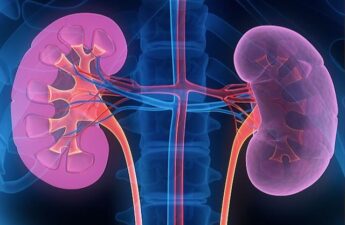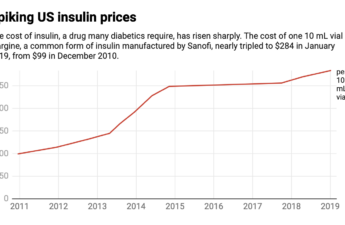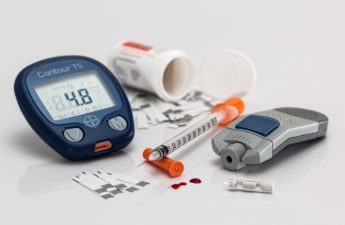Category: Kidney
Social factors help explain worse cardiovascular health among adults in rural vs. urban communities
Researchers found that factors such as levels of income and education, having enough food to eat, and owning a home mostly explained the higher rates of people in rural areas who had high blood pressure, diabetes, and heart disease.
Chronic kidney disease often goes undiagnosed, but early detection can prevent severe outcomes
In the U.S., the biggest contributors to developing chronic kidney disease are high blood pressure and diabetes. Up to 40% of people with diabetes and as many as 30% of people with high blood pressure develop chronic kidney disease.
New Study Links Millions of Diabetes and Heart Disease Cases Globally to Sugary Drinks
A new study estimates that sugar-sweetened beverages contribute to 2.2 million new diabetes cases and 1.2 million new cardiovascular disease cases annually. The impact is particularly severe in developing countries, where sugary drinks are heavily marketed and contribute to a significant portion of new diabetes and heart disease cases. The study’s authors call for urgent interventions, including public health campaigns, advertising regulation, and taxes on sugary beverages.
Health News Headlines
Which ultraprocessed foods are worse? – HPV vaccine – Mpox – Drug ads
Does eating ham, bacon and beef really increase your risk of developing type 2 diabetes?
The size of the increased risk is modest, considering few people included in the study ate 50g — about 2 ounces — or more processed meat per day – meaning moderate ham consumption is likely to have no meaningful effect on your risk.
Prescriptions for fruits and vegetables can improve the health of people with diabetes and other ailments, new study finds
Patients’ blood sugar levels, blood pressure and weight improved.
Eli Lilly is cutting insulin prices and capping copays at $35 – 5 questions answered
High insulin prices have not earned any U.S. manufacturer many friends, with list prices increasing 54% from 2014 to 2019. Most troublingly, an estimated 1.3 million uninsured people with diabetes and patients with inadequate insurance have resorted to rationing their insulin. Skipping doses because of high insulin prices has sometimes had tragic and even deadly consequences.But growing competition has shaken up the insulin market in recent years.
Sitting all day is terrible for your health – now, a new study finds a relatively easy way to counteract it
To reduce the harmful health effects of sitting, take a five-minute light walk every half-hour. We found that a five-minute light walk every half-hour was the only strategy that reduced blood sugar levels substantially compared with sitting all day. In particular, five-minute walks every half-hour reduced the blood sugar spike after eating by almost 60%. That strategy reduced blood pressure by four to five points compared with sitting all day. But shorter and less frequent walks improved blood pressure too. Even just a one-minute light walk every hour reduced blood pressure by five points.
Future Surge in Diabetes Could Dramatically Impact People Under 20 in U.S.
This expected upward trend may lead to as many as 220,000 young people having type 2 diabetes in 2060 —a nearly 700% increaseand the number of young people with type 1 diabetes could increase by as much as 65% in the next 40 years. Even if the rate of new diabetes diagnoses among young people remains the same over the decades, type 2 diabetes diagnoses could increase nearly 70% and type 1 diabetes diagnoses could increase 3% by 2060.
Why South Asians are at increased risk for diabetes: A complex interplay of genetics, diet and history
South Asians are particularly insulin resistant. Compared to Caucasians, South Asians had higher insulin concentrations in their blood after ingesting sugar. This means that South Asian individuals require more insulin to regulate their blood sugar levels, a characteristic of Type 2 diabetes. There are numerous possible explanations for this, but genetic variants could be one culprit.
Nonprofit drugmaker Civica Rx is taking aim at the high insulin prices harming people with diabetes
Civica Rx, a non-profit that manufactures generic drugs, is planning to produce generic insulin for a price of no more than $30 for a month.
Doctors Overlook a Curable Cause of High Blood Pressure
More than six decades after primary aldosteronism was first described in the medical literature, less than 1 percent of cases are diagnosed and treated despite evidence that it is a common cause of high blood pressure, or hypertension.
Can an equation be racist?
Medical algorithms that correct for gender, age, comorbidities, and race span specialties from nephrology to cardiology to pediatrics to obstetrics. Such calculators help guide practitioners in daily decisions about everything from drug dosages to surgery to organ transplants. But race modifiers especially raise problems, since race is often an imprecise proxy for actual ancestry.
Looking at our early human ancestors for insights into modern diseases
Our ancestors’ environment and diets, and the limits of our biology, have led to adaptations that have improved human survival through natural selection. But we remain prone to illness and disease anyway.
Do you really need to drink 8 glasses of water a day?
Drinking eight glasses of eight ounces of water per day, is not right for everyone.












